PAGEANT - "Education is the future"
Microscopy Workshops 2012
As a professional microscopist, Pippa Howard has always been enthusiastic about revealing the wonders seen under the microscope to Gambian children. From 2002 onwards, the Royal Microscopical Society funded a number of microscopes which were given to Gambian schools. Pageant then organised Microscope Competitions for students in these schools, with children producing drawings of things seen under microscopes.
In The Gambia, Science is often taught as a purely theoretical subject - many schools lacking any facilities for practical science teaching. So Pageant runs workshops for science teachers:
Microscopy Workshops where teachers were given hands-on experience using a variety of microscopes, especially suited for use in schools without mains electricity;
Science Workshops from which teachers take away the skills and teaching kits to add a practical aspect to science lessons in schools with no practical science facilities.
The 2012 Microscopy and Science Workshops were held simultaneously in two rooms at Gambia College over four days - 11th to 15th February 2012. Gambia College is located in Brikama, a town about 20 miles south of the capital, Banjul, with good tarmac road access. Each room accommodated 20, so each of the 80 student teachers attending spent one day at the Microscopy Workshop and one day at the Science Workshop. This is Pippa Howard's report on the Microscopy Workshops.
Microscopy Workshops 2012 - Pippa's report
Twenty of the microscopy 'kits' were used during the workshops, so each teacher had one complete kit to open up, use and repack in an effort to show them what was available, how to use it and how to ensure that the materials provided could be ready for re-use on future occasions. Each workshop kit contained one Motic monocular x20 microscope and one Apex binocular x20 stereo microscope, both using reflected light to view the samples. All 50 of the Motic MS-2 microscopes were donated to us by Motic Europe - see news item about Motic. There were also 10 multi-objective transmitted light microscopes available for the workshop student teachers to use. 20 of these had been donated by Tyne Metropolitan College - see news item about Tyne Metropolitan College. There were also 2 cartons in each kit, holding a variety of related 'goodies' to keep children occupied and interested while waiting for their turn to look down an actual microscope. These cartons contained a variety of hand-lenses, some cardboard binoculars (surprisingly good and VERY popular), a wind-up torch for sample illumination, small bug-boxes, sample collecting bags and bottles, petri-dishes, pipettes, tweezers, slides, glue sticks, labels etc.... you get the idea.
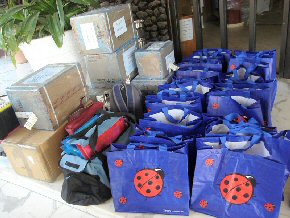
bags containing microscopy kitscaption
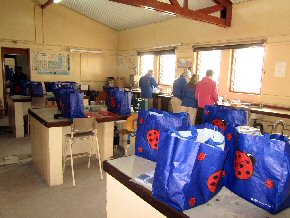
setting up - each student teacher has a bag
The first session of each workshop was spent in going through the cartons and showing the student teachers how the contents could be used by the children in their (large) classes. The hand-lenses were tried out at increasing magnification, ending with a x10 loupe, one of which was given to each teacher as their own personal microscope - we encouraged them to keep the loupes in their pockets and to bring them out when they found something interesting to look at.
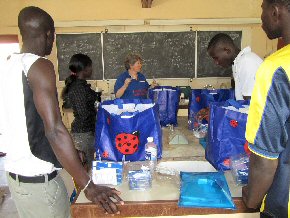
opening the bags - hand lens first
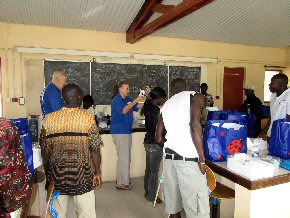
next - a Motic monocular 'stereo' microscope
Each student teacher then had three further sessions familiarising themselves with the three types of microscopes available to them and using them to look at a wide variety of samples, both those we provided and some that they went out and found for themselves. The samples included biological samples and manufactured items - of the latter, printing, different types of fabric and Velcro proved to be particularly popular. Grasses, flowers, twigs, insects and sand were examined and discussed and some of the students found a small puddle of what appeared to be clear water - I was then dragged across the classroom to see 'that there are actually creatures swimming here'!! Mould on bread was examined with interest - and even more so when some students found that 'penicillin from mould' was among the prepared slides that we provided for the transmitted light microscopes. The enthusiasm was immense - 'Come and see this'; 'Please look at what I have here'; 'Quick, quick, come here' and so on made for a really rewarding (if exhausting!) four days.
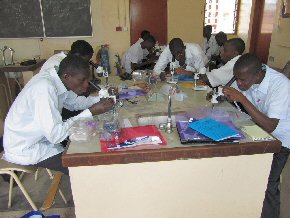
class with Motics
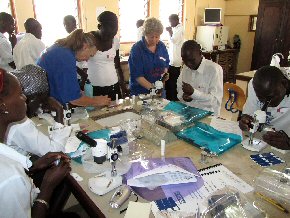
class in full swing with Motics
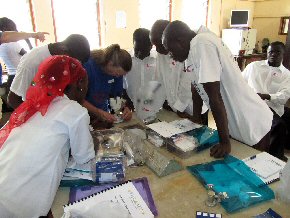
demo of Apex binocular stereo microscope
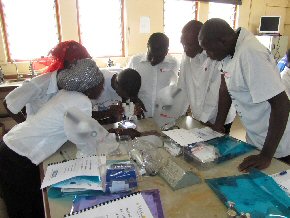
class trying the Apex
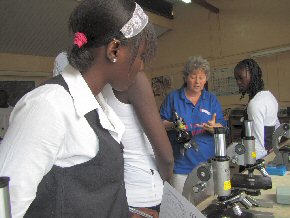
demo of a transmitted light microscope
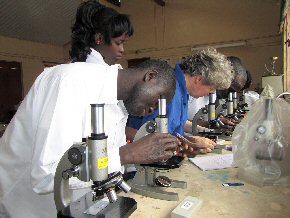
class using transmitted light microscopes
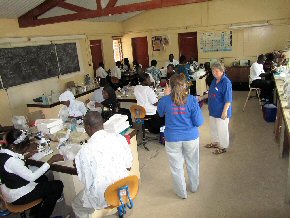
busy class
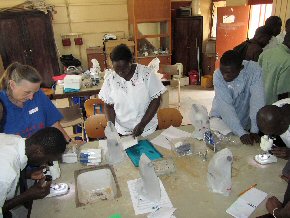
using Apex while the Motics are covered
to protect them against dust
The final session of each day was for the student teachers to show us what they had learnt about using the microscopes and other materials, with groups of children from local schools. Many of them did really well, though a few had the tendency to 'hog' the microscopes for themselves. The children themselves were enthralled - trying to get them to leave at the end of the session was the biggest problem. The group that came on the final day asked particularly good questions and I found to my surprise that they were all Grade 7 - i.e. one year out of primary school. They came with their science teacher, who was also completely absorbed by the whole thing and really appreciated the value of all the additional extra things we had provided for each kit. He hopes that one of the newly graduated science teachers may be posted to his school with such a kit - if not, I have said I will do my best to provide him with something similar in the near future.
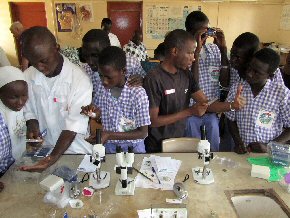
eager local school children arrive
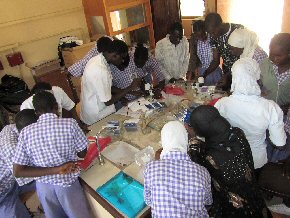
student teachers with children
In all, we took 50 microscopy kits with us - 10 will remain at Gambia College, to enable further teaching to be carried out there. The other 40 kits will go with 40 of these student teachers, once they are qualified, to the schools to which they are posted. We are making some recommendations as to which of the workshop participants should be the lucky ones, and will try to let others who have NOT received one of these kits have similar materials as funds become available. Many of the newly qualified teachers will be posted to schools way up-country, where we could never hope to run workshops, so this should be a way of spreading both materials and know-how through The Gambia.
The make-up of the kits will differ slightly: all 50 kits will contain one Motic microscope and the cartons of 'additional extras'; the 10 kits remaining at Gambia College and 10 other kits destined for senior schools will contain a transmitted light microscope; the other 30 kits for primary and junior secondary schools will contain an Apex binocular microscope. In this way we hope that the microscopes provided will be suitable for the children of the schools to which they go.